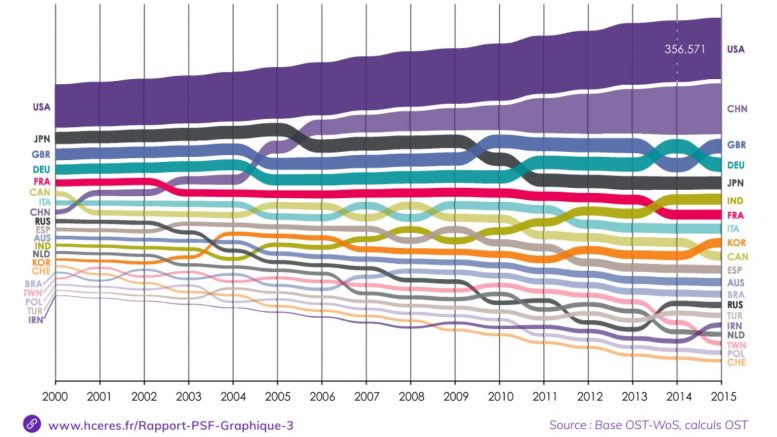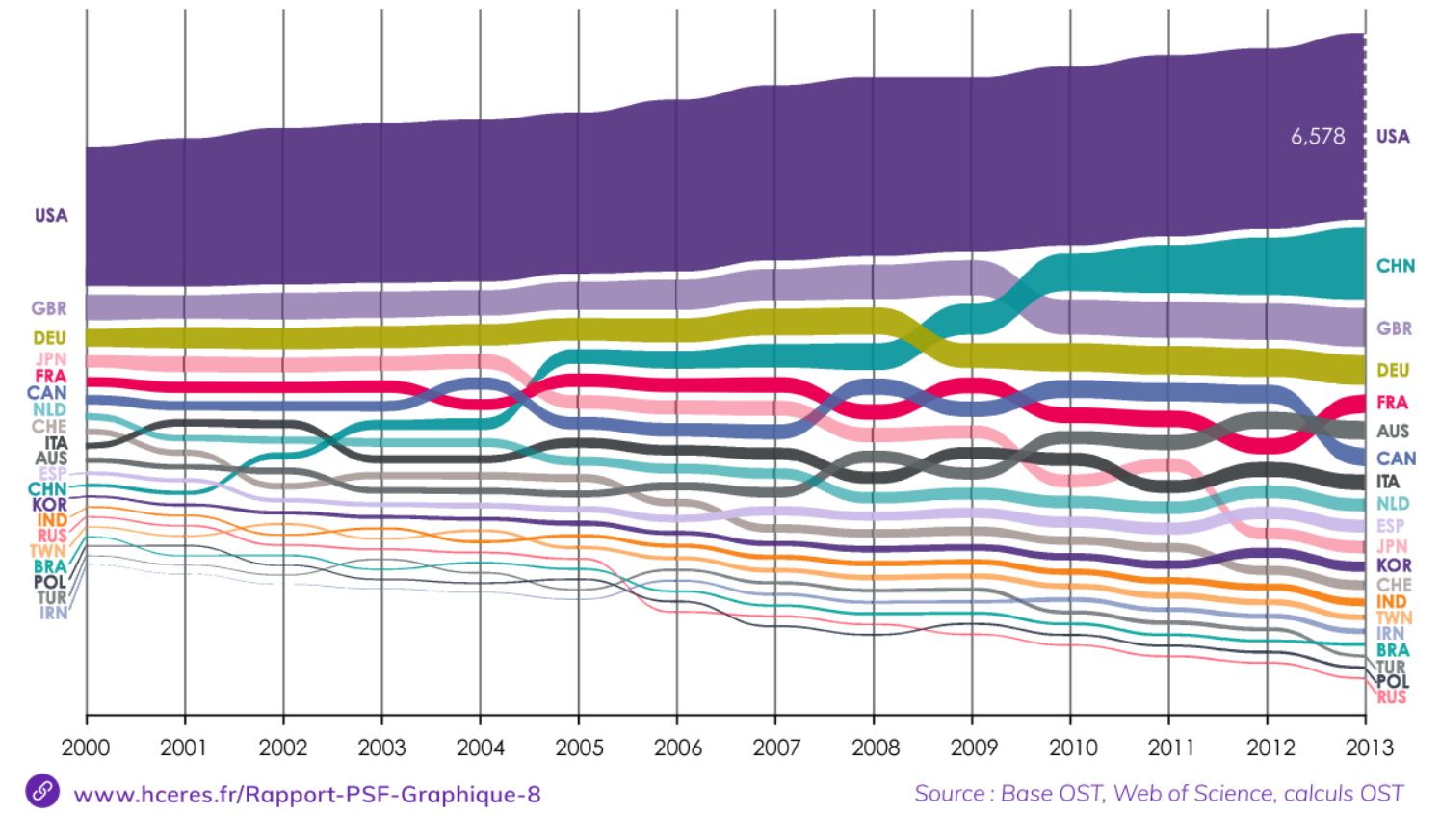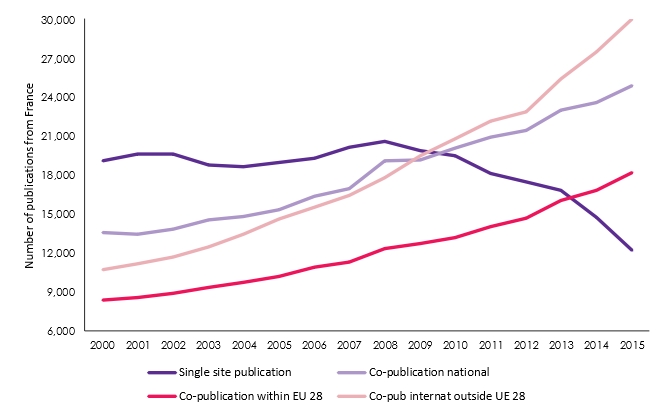The economic, commercial and geo-political status of nations is derived from their scientific and technological prowess. A new report charts how this balance of power has altered since the turn of the millennium. John Egan reviews the emerging new world order.
Publish or perish is a well-known maxim in academic research circles. Now big data is set to reveal how this Darwinian world is evolving and, indeed, accelerating towards ever greater inequality.
Science cannot be disconnected from its socio-economic consequences. Sitting at the very origins of knowledge, one should expect that knowing who is doing what, along with the intelligence to engage, should be a source of competitive advantage – and exclusion.
An impressive new bibliometric study for Hcéres[1], responsible in France for the evaluation of research and higher education, surveys a global scientific landscape that is changing with startling rapidity.
Notably, since 2000 China has hauled itself from eighth to second place, just below the United States, in international rankings based on the number of scientific publications listed on the massive Web of Science database.
It might be argued that these findings are more a matter of quantity than quality, and the Hcéres report does show the average impact of scientific papers originating in China is about 15 per cent below the average for the world. However, when it comes to accounting only for the world’s most cited papers (top-centile), then China’s share rose by a factor of 25, taking the country from 12th to 2nd ranking in the 13 years to 2013.
For the United Kingdom there was a more subdued increase of about 1.5 over the same period, though still enabling the country to retain its prestigious third-place ranking.
India is also seen to be emerging rapidly in terms of the quantity of publications but, unlike China, the quality may be suffering with their already small proportion of the most cited papers falling over time. Japan, on the other hand has been pushed down in both respects.
Another shift in behaviour since 2000 has been a trend to develop international scientific collaborations as shown here for France. Indeed, the number of articles published from a single research centre fell by 50 per cent, despite a 65 per cent rise in papers published over the same duration.
What is striking in the Hcéres report is the acceleration of the observed changes over a relatively short interval. Opportunities and risks are likely to arise in equal measure.
The global trends provide a high-level view of the changes in scientific competence and practice. Moving down to a disciplinary level reveals differences in national behaviour. An “index of specialisation” identifies disciplines with a particular national focus – an index above 1 applies when national activity is above the level expected from the overall global publication data.
The radar chart of the index of specialisation provides a fingerprint of national scientific endeavour. The charts shown below reveal national similarities and differences.
On the left the patterns of index of specialisation for the US and UK are similar, with the UK additionally showing a marked interest in human sciences (e.g. archaeology, linguistics, philosophy, psychology). The specialisation emerging in publications from China is strikingly different with a focus on engineering, chemistry, physics and mathematics.
The argument to weave these modest individual endeavours into a European fabric of scientific discovery at a scale that can match the newly emerging superpowers should be compelling.
Taking a European perspective, the radar chart on the right shows Germany with a broad and balanced set of disciplinary interests. For France, the pattern is similar along with its renowned national specialisation in mathematics, the opportunities from which are explored in detail in the Hcéres report. This provides a background to recent policy development, particularly in the area of artificial intelligence (AI).
Reported foci on medical research in the Netherlands and Italy, social sciences in Sweden and applied biology in Spain add to the disciplinary mix across Europe. The argument to weave these modest individual endeavours into a European fabric of scientific discovery at a scale that can match the newly emerging superpowers should be compelling.
So, with scientific research becoming increasingly international and with large emerging economies expected to play an increasingly important role, one might expect the landscape to continue to change rapidly into the future.
But does it matter?
The ripples from the discovery of the Higgs boson must travel far to reach the factory floor or impact on real lives in households in the United States, Britain or France. And national borders are notoriously porous to the diffusion of scientific knowledge.
The answer depends on the value of participating in new knowledge creation and whether this places the participants in a privileged position to acquire the ensuing wealth that follows. The list of technologies queueing to impact upon societies is long: AI, robotics, big data, nanotechnologies, quantum computing, genetic engineering, immuno-therapies et al.
Wealth and power are likely to concentrate around those with the essential scientific and technical know-how.
There are notable lacunae in the above list of the 20 most productive nations in the world of scientific discovery. There is a complete absence of participation from Africa, along with many developing nations in Asia and South America.
As progress accelerates as expected, it will become increasingly difficult to join this club and, without measures perhaps involving extensive education and knowledge-sharing initiatives, inequalities between nations are likely to widen, accompanied by the inevitable and well-known socio-economic consequences.
Notes
[1] The study report entitled La position scientifique de la France dans le monde 2000-2015 was published by the Observatoire des Sciences et Techniques

Image credits: © www.hceres.fr
Source: Base OST, Web of Science, calculs OST







